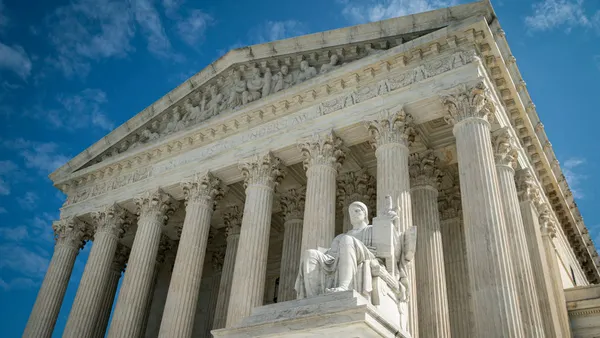Dive Brief:
- A Louisiana rehabilitation hospital did not violate Title VII of the Civil Rights Act of 1964 when it fired a nurse for inappropriate conduct with a patient, the 5th U.S. Circuit Court of Appeals ruled last week (Landry v. Leesville Rehabilitation Hospital, No. 21-30423 (5th Cir., Feb. 7, 2022)).
- The nurse sued her employer for race discrimination, harassment and retaliation following her termination. The hospital maintained it fired her over the way she interacted with a patient, whom the nurse confronted for inappropriately touching her, making a sexual remark about her, and spreading a rumor concerning her.
- The hospital fired the nurse because of her conduct. She allegedly woke the patient, who was sleeping in a dark room, causing him to startle and reinjure his back, he claimed. The nurse's supervisor witnessed the interaction and agreed her behavior was "forceful." Moreover, the incident wasn't the nurse's first alleged misconduct directed toward a patient, according to court documents.
Dive Insight:
Employers may be particularly interested in the 5th Circuit's discussion of the plaintiff's harassment claims, as the court carefully compared her claims to those in previous cases.
The nurse argued that she was subjected to sexual harassment so severe that it altered the conditions of her employment and created an abusive working environment — the standard such harassment must meet to stand up in court. To meet this standard, the nurse had to prove that the harassment she experienced was either severe or pervasive. She pointed to two events to argue that she met that bar: the patient she eventually confronted touched her inappropriately and, a few minutes later, called her a "sexy, beautiful Black woman."
The court concluded that, though it thought the behavior "offensive," it did not find it to be severe. "We have previously refused to find severe harassment when, among other things, a coworker made a comment about a fellow employee's body, slapped an employee's behind with a newspaper, and held her cheeks and tried to kiss her," the court opined. "The cited cases all involved more serious harassment than occurred in this case."
The plaintiff's argument that the conduct was pervasive likewise failed. The nurse compared her experience with a 2013 case in which a woman's two co-workers came into her office and sniffed her. "Each coworker did so twelve times over the course of her four-day employment, which the court concluded could qualify as pervasive," the 5th Circuit said in its analysis. "The harassment in [this case] was much more frequent than it was in [the plaintiff's] case."
At the onset of its analysis, the court recognized that the plaintiff's allegations arrived with special context. The plaintiff worked at a rehabilitation hospital, the court noted. "Our precedents have recognized that the 'unique nature' of these kinds of care facilities 'is an important consideration' when determining whether harassment was severe or pervasive," the court said. "That is because, as the Leesville employee handbook recognizes, '[i]nappropriate sexual conduct by patients' is unfortunately 'not uncommon in a healthcare facility.' This behavior is often a result of patients suffering from illness and diminished capacity."











